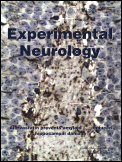 | |
| Discipline | Neurology, neuroscience |
|---|---|
| Language | English |
| Edited by | Ahmet Hoke |
| Publication details | |
| History | 1959-present |
| Publisher | |
| Frequency | Monthly |
| 5.33 (2020) | |
| Standard abbreviations | |
| ISO 4 | Exp. Neurol. |
| Indexing | |
| CODEN | EXNEAC |
| ISSN | 0014-4886 (print) 1090-2430 (web) |
| LCCN | 61038087 |
| OCLC no. | 848514410 |
Neurodegeneration | |
| ISSN | 1055-8330 |
| Links | |
Experimental Neurology is a monthly peer-reviewed medical journal that focuses on research in neuroscience concerning mechanisms underlying neurological disorders. The journal focuses on neural development, neuroregeneration, neuroplasticity, and transplantation,. It was established in 1959 and is published by Elsevier. According to the Journal Citation Reports , the journal has a 2020 impact factor of 5.33. [1] In 1997, Experimental Neurology absorbed the quarterly journal Neurodegeneration , [2] which had been established in 1992.